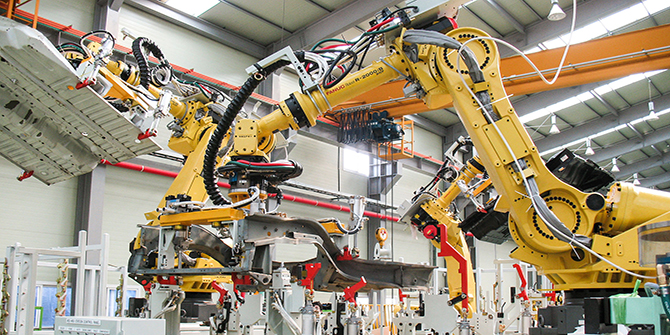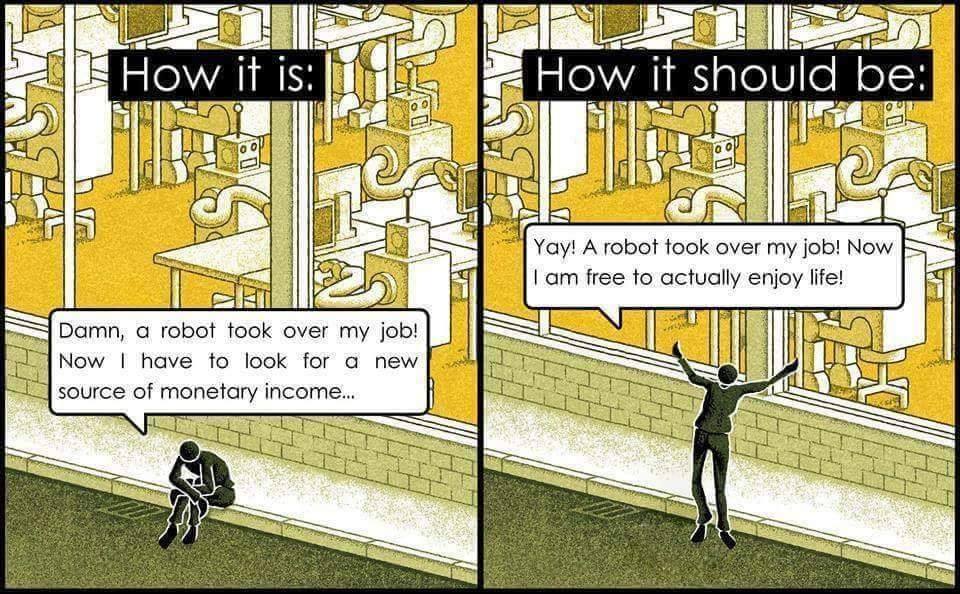More languages
More actions
Jucheguevara (talk | contribs) No edit summary Tag: Visual edit |
m (added categories.) Tag: Visual edit |
||
| (7 intermediate revisions by one other user not shown) | |||
| Line 1: | Line 1: | ||
[[File:Robotic arm.jpg|thumb| | [[File:Robotic arm.jpg|thumb|279x279px|A robotic arm which is able to perform manual tasks at a higher efficiency than human workers, with higher uptime (ability to work 24/7, unlike human workers who require rest and leisure time) ]] | ||
[[File:Robots Taking Jobs Under Socialism vs Capitalism.jpg|thumb|280x280px|Meme demonstrating the irrationality of the capitalist economic system; heightened technological progress shouldn't result in human misery, it should result in the liberation of the workers from their toils. ]] | |||
'''Automation''' describes a wide range of technologies that reduce human intervention in processes, typically in the realm of economic production. | '''Automation''' describes a wide range of technologies that reduce human intervention in processes, typically in the realm of economic production. | ||
Under | Under [[Capitalism|capitalist]] economic relations, these labor-saving technologies threaten job security of workers and thus lower wages or reduce them to zero altogether. Manual laborers are in competition with machines<ref>{{News citation|newspaper=DesignNews|title=At the Pacific Design and Manufacturing Show, robot makers acknowledged that robots will replace human workers.|url=https://www.designnews.com/automation-motion-control/robots-are-displacing-manual-labor-jobs}}</ref>, and knowledge workers are in competition with information systems.<ref>{{News citation|title=“I was the first knowledge worker whose job was threatened by a machine”|url=https://thefinanser.com/2020/02/i-was-the-first-knowledge-worker-whose-job-was-threatened-by-a-machine.html/}}</ref><ref>{{News citation|newspaper=Vox {{!}} Recode|title=“Knowledge workers” could be the most impacted by future automation|url=https://www.vox.com/recode/2019/11/20/20964487/white-collar-automation-risk-stanford-brookings}}</ref> This results in technological unemployment, where workers become unemplloyed through no fault of their own. The bourgeoisie has coined the sinister term "[[useless class]]" for these people. | ||
Under a [[Socialism|socialist]] economic system, labor-saving technologies can be used to enhance the quality of life for the working class by reducing work hours, enhancing societal productivity, and moving towards the immense abundance of [[post-scarcity]]. | Under a [[Socialism|socialist]] economic system, labor-saving technologies can be used to enhance the quality of life for the working class by reducing work hours, enhancing societal productivity, and moving towards the immense abundance of [[post-scarcity]].<ref>{{News citation|title=The Two Futures Of Automation: Capitalism VS Socialism|url=https://youtu.be/6WwHvNDrGV0|newspaper=[[Second Thought]]}}</ref> | ||
== | == Relevant quotes == | ||
=== Che Guevara === | === Che Guevara === | ||
[[Che Guevara]], the revolutionary who helped to | [[Che Guevara]], the revolutionary who helped to [[Cuban Revolution|liberate]] Cuba from US imperialism, said the following regarding the relationship between workers and machines:<blockquote>We must remember that machines do not, as in the capitalist system, compete with workers or enslave workers. Workers must view machines as the liberators of their force. Machines are placed at the service of workers as soon as the exploitation of man by man stops. And that is what we are striving for: we are trying to turn machines into liberating instruments of peasants, so they will have more time for leisure, so they will have more time to study, to develop in every sense, to achieve the most important thing we must achieve: individuals developed to the full, this is the aim we are all struggling for.<ref>Speech at the National Sugar Plenary Meeting in Camagüey, February 9, 1963 ''Ernesto Che Guevera. Escritos y discursos.'' Op. cit., vol. 7.</ref></blockquote> | ||
=== Stephen Hawking === | === Stephen Hawking === | ||
Stephen Hawking was a world-renowned theoretical physicist and cosmologist who has contributed significantly to both fields. The following quote is from a Reddit reply he wrote towards the end of his life | Stephen Hawking was a world-renowned theoretical physicist and cosmologist who has contributed significantly to both fields. The following quote is from a Reddit reply he wrote towards the end of his life: <blockquote>If machines produce everything we need, the outcome will depend on how things are distributed. Everyone can enjoy a life of luxurious leisure if the machine-produced wealth is shared, or most people can end up miserably poor if the machine-owners successfully lobby against wealth redistribution. So far, the trend seems to be toward the second option, with technology driving ever-increasing inequality.<ref>{{News citation|title=STEPHEN HAWKING'S WARNING ON ROBOT AUTOMATION IS MORE RELEVANT THAN EVER|url=https://www.inverse.com/article/42267-stephen-hawking-robot-automation}}</ref></blockquote> | ||
== Further reading == | |||
* [https://en.wikipedia.org/wiki/Automation Automation on English Wikipedia] | |||
== References == | == References == | ||
<references /> | |||
[[Category:Economic concepts]] | |||
Latest revision as of 20:05, 31 July 2022


Automation describes a wide range of technologies that reduce human intervention in processes, typically in the realm of economic production.
Under capitalist economic relations, these labor-saving technologies threaten job security of workers and thus lower wages or reduce them to zero altogether. Manual laborers are in competition with machines[1], and knowledge workers are in competition with information systems.[2][3] This results in technological unemployment, where workers become unemplloyed through no fault of their own. The bourgeoisie has coined the sinister term "useless class" for these people.
Under a socialist economic system, labor-saving technologies can be used to enhance the quality of life for the working class by reducing work hours, enhancing societal productivity, and moving towards the immense abundance of post-scarcity.[4]
Relevant quotes[edit | edit source]
Che Guevara[edit | edit source]
Che Guevara, the revolutionary who helped to liberate Cuba from US imperialism, said the following regarding the relationship between workers and machines:
We must remember that machines do not, as in the capitalist system, compete with workers or enslave workers. Workers must view machines as the liberators of their force. Machines are placed at the service of workers as soon as the exploitation of man by man stops. And that is what we are striving for: we are trying to turn machines into liberating instruments of peasants, so they will have more time for leisure, so they will have more time to study, to develop in every sense, to achieve the most important thing we must achieve: individuals developed to the full, this is the aim we are all struggling for.[5]
Stephen Hawking[edit | edit source]
Stephen Hawking was a world-renowned theoretical physicist and cosmologist who has contributed significantly to both fields. The following quote is from a Reddit reply he wrote towards the end of his life:
If machines produce everything we need, the outcome will depend on how things are distributed. Everyone can enjoy a life of luxurious leisure if the machine-produced wealth is shared, or most people can end up miserably poor if the machine-owners successfully lobby against wealth redistribution. So far, the trend seems to be toward the second option, with technology driving ever-increasing inequality.[6]
Further reading[edit | edit source]
References[edit | edit source]
- ↑ "At the Pacific Design and Manufacturing Show, robot makers acknowledged that robots will replace human workers.". DesignNews.
- ↑ "“I was the first knowledge worker whose job was threatened by a machine”".
- ↑ "“Knowledge workers” could be the most impacted by future automation". Vox | Recode.
- ↑ "The Two Futures Of Automation: Capitalism VS Socialism". Second Thought.
- ↑ Speech at the National Sugar Plenary Meeting in Camagüey, February 9, 1963 Ernesto Che Guevera. Escritos y discursos. Op. cit., vol. 7.
- ↑ "STEPHEN HAWKING'S WARNING ON ROBOT AUTOMATION IS MORE RELEVANT THAN EVER".
